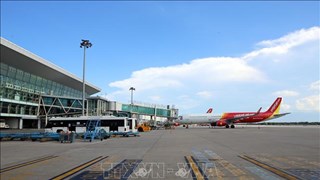Top 10 international events in 2023 selected by VNA
1. Israel - Hamas armed conflict threatens regional security
The Hamas force’s surprise attack on October 7, drawing military response by Israel in the Gaza Strip, has pushed the Middle East to the brink of humanitarian disaster. As of December 24, more than 21,300 people had been killed and over 52,000 others injured.
Thanks to diplomatic efforts by the international community, the two sides implemented a seven-day truce, starting November 24, exchanging 320 hostages and prisoners. However, fighting resumed as soon as the ceasefire agreement collapsed. The root cause of the conflict has not been resolved, causing violence to flare up at any time, threatening security in the entire region.
2. Peaceful solution to Russia - Ukraine conflict still far away
The conflict between Russia and Ukraine has become deadlocked and fighting continues while the two sides refuse to sit down and talk. Western countries continue to provide arms supplies to Ukraine and impose new sanctions against Russia. Russia has formally withdrawn from the Treaty on Conventional Armed Forces in Europe, revoked its ratification of the Comprehensive Nuclear-Test-Ban Treaty, and pulled out of the Black Sea grain deal. The prolonged confrontation continues to impact global security, politics, and economy.
3. World economic recovery slows down
The Organisation for Economic Cooperation and Development (OECD) forecast that the world economy will grow by 2.9% in 2023, down from last year’s 3.3%. The decline is due to the "seismic" financial impact of the collapse of such banks as Silicon Valley, Signature, and First Republic of the US and Switzerland’s Credit Suisse, along with the energy crisis and conflicts in Ukraine and the Middle East. Central banks in many countries must weigh raising interest rates to control inflation and suspending hikes to support economic recovery.
4. Rice export restrictions, climate change threaten global food security
The ban on non-basmati white rice exports and the imposition of a 20% export duty on parboiled rice by India - the world's largest rice exporter - along with climate change impacts causing severe drought, have reduced rice supplies, pushed up rice prices, and negatively impacted food security in many countries, especially poor ones in Asia and south of the Sahara Desert. Given this, the Global Food Security Summit, which took place in the UK on November 20, proposed solutions towards a sustainable food system and climate change adaptation.
5. AI application promotion goes in tandem with control efforts
The strong development of artificial intelligence (AI) and its wide application in many fields have brought about great changes in many industries but at the same time posed quite a few challenges.
The first global summit on AI, held in the UK on November 2, agreed on joint efforts to manage potential risks from AI. The European Union (EU) has accelerated the building of the first AI Act. The US issued its first executive order on AI management to ensure AI is developed and applied in a safe and responsible way, and for the benefit of the global community.
6. COP28 reaches historic agreement to phase out fossil fuels
The 28th Conference of the Parties to the UN Framework Convention on Climate Change (COP28) in Dubai, the United Arab Emirates (UAE), on December 13 agreed for the first time to transition away from fossil fuels in energy systems in a just, orderly and equitable manner, to achieve net zero by 2050. The parties also pledged to triple renewable power capacity globally by 2030.
This is a step forward in climate change response in the context that 2023 has been seen as the hottest over the past 125,000 years, taking the earth from a "warming" period to a "heating" one.
7. Devastating earthquake in Turkey
The February 6 earthquake with a magnitude of 7.8 – the most powerful in Turkey in nearly a century - killed about 50,000 people in the country and nearly 6,000 others in neighbouring Syria.
The world also witnessed a series of other serious disasters, including the Morocco earthquake on September 9 that left nearly 3,000 people dead, Storm Daniel that devastated Libya with unprecedented flooding the same month, killing more than 11,300 people and leaving about 10,100 others missing, and Hawaii wildfires, the deadliest US blaze in a century, with more than 100 people reported dead and hundreds missing in mid-August.
8. Continuous coups cause instability in Africa
The trend of unconstitutional changes of governments in many African countries has driven instability in the region, exacerbating the challenges of poverty, and hunger and inequality.
Military mutinies to overthrow the governments in Niger on July 26 and in Gabon on August 30 continued the wave of coups in West and Central Africa, with eight coups over the past three years.
9. Race to conquer space
India has become the first country to successfully land a spacecraft on the moon's south pole, and successfully launched its first observation mission to the sun. Japan launched a rocket with a lunar lander to the moon, while Russia's Luna-25 moon lander crashed into the moon when attempting to land onto it. Europe’s Euclid space satellite was launched to explore ‘dark matter’. NASA has also launched a spacecraft to explore Psyche, the largest metal-rich asteroid in our solar system.
The United Nations General Assembly on December 4 passed a resolution titled “No first placement of weapons in outer space”.
10. India becomes world’s most populous country
According to UN data, on April 14, India's population reached 1,425,775,850, officially overtaking China to become the world’s most populous country. The population growth has brought about advantages in terms of workforce to India, but also generated many challenges in ensuring food, housing, medical conditions and education./.













